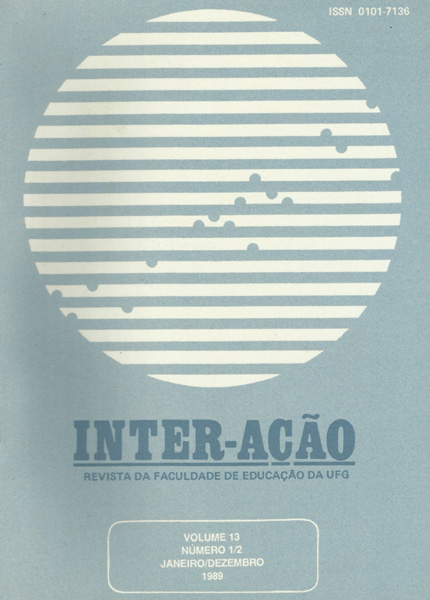CONDIÇÕES ESCOLARES E EXPECTATIVAS DA POPULAÇÃO RURAL DE GOIÁS FRENTE A SEU PROCESSO DE ESCOLARIZAÇÃO
DOI:
https://doi.org/10.5216/ia.v13i1/2.55277Abstract
Trata-se de um estudo sobre as condições do ensino rural em Goiás. Faz-se a análise teórica e histórica da sociedade goiana enquanto realidade sócio-econômica e político-cultural: enfoca-se uma possível relação entre a totalidade anteriormente estudada e os dados empíricos coletados e registrados na pesquisa "Diagnóstico do ensino rural em Goiás", da qual são selecionados seis temas. O exame desses temas leva ao reconhecimento de que a escola no meio rural em Goiás é apenas um arremedo de escola repudiado pelos professores e pela população rural. Conclui-se pela afirmação de que "as questões educacionais rurais de Goiás não podem ser pensadas fora da historicidade das questões educacionais básicas das classes subalternas. Elas só podem ser entendidas no interior da luta pelo ensino público, gratuito e de qualidade, e da luta pela democratização de todas as instâncias da sociedade brasileira".Downloads
Downloads
Published
How to Cite
Issue
Section
License
Inter-Ação uses the Creative Commons Attribution 4.0 License for Open Access Journals (Open Archives Initiative - OAI) as the basis for the transfer of rights. Open access means making documents available on the Internet free of charge, so that users can read, download, copy, distribute, print, search, or link to the full text of documents, process them for indexing, use them as input data for software programs, or use them for any other lawful purpose, without financial, legal, or technical barriers.
Authors publishing in this journal agree to the following conditions:
1) Authors retain copyright and grant the journal the right of first publication, with the work simultaneously licensed under the Creative Commons Attribution License, which permits redistribution of the work with attribution and first publication in this journal.
2) Authors are permitted to enter into additional, separate agreements for non-exclusive distribution of the version of the work published in this journal (e.g., for publication in an institutional repository or as a book chapter), with attribution and first publication in this journal.
3) Authors are permitted and encouraged to publish and distribute their work online (e.g. in institutional repositories or on their home page) at any time before or during the editorial process, as this may generate productive changes as well as increase the impact and citation of the published work.















